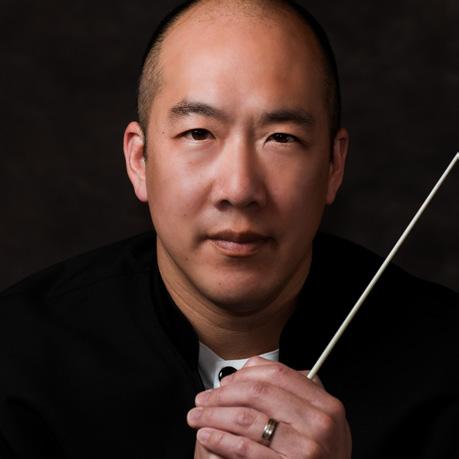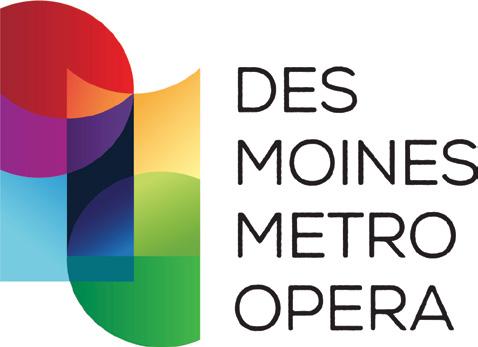 DES MOINES METRO OPERA WINTER 2023
50TH ANNIVERSARY PHOTO RETROSPECTIVE / 2023 SEASON PREVIEWS / UPCOMING EVENTS / TICKET INFORMATION
DES MOINES METRO OPERA WINTER 2023
50TH ANNIVERSARY PHOTO RETROSPECTIVE / 2023 SEASON PREVIEWS / UPCOMING EVENTS / TICKET INFORMATION

ABOVE The rising stars of the Apprentice Artist Program shine during the Stars of Tomorrow orchestral concert at Sheslow Auditorium on the Drake campus. ON THE COVER Kevin Deas takes center stage as Porgy with (l to r) Errin Duane Brooks (Robbins), Timothy D. Parrot (chorus), David Morgans Sanchez (Mingo) and Jermaine Smith (Sportin’ Life) in the 50th anniversary season’s production of Porgy and Bess

Editor/Designer KIM DRAGELEVICH
Contributors SCOTT ARENS, JOSHUA BORTHS, BLAKE CARLSON, KRISTINE MCINTYRE
Photographers JEN GOLAY, PHILIP NEWTON, JOHN SCHULTZ, DUANE TINKEY
Proofreader JULIA HAGEN
newsletter
annually by Des Moines Metro
Inc., 106 West
Vivace is a
published
Opera,
Boston Avenue, Indianola, Iowa 501251836. Volume 10, Issue 1.
WeLCOme
When we said Des Moines Metro Opera was up to big things, we meant it!
Year by year, production by production, we moved with purpose and strategy towards our milestone 50th anniversary occasion in 2022. We unveiled the new Lauridsen Opera Center in 2019 and delivered hope and light in the dark days of a global pandemic in our 2020 virtual season. We realized the urgency behind a return to safe, in-person performances in 2021 while honoring the passing of our founder Robert L. Larsen. And in 2022 we arrived at five “wow” projects for a 50th anniversary. Each were historic milestones for the company in their own right.
Now, following the successful completion of our 50NEXT endowment campaign, we can envision the next 50 years from a position of financial strength. Forward movement in changing times requires big dreams. We’ve certainly dreamt large. And you’ve dreamt with us! I’m incredibly proud of all we’ve accomplished together. I hope you are, too. I remain deeply grateful and humbled by the broad and generous support from so many loyal friends. Now we’re already looking forward to the next big projects.
In December I heard a libretto reading of the expanded version of American Apollo with text by Lila Palmer. Next Damien Geter will set her words to music. The Apollo project is putting wind in my sails these days, and I look forward to sharing it with you in 2024. Before then we have five productions to prepare for you in the 2023 season.
Bizet’s ever-popular masterpiece Carmen returns to our stage along with the company premieres of two fairy tales from the fringe: Bartók’s Bluebeard’s Castle, featuring operatic superstar Christian Van Horn, in a new production led by director Kristine McIntyre and international visual image composer and Des Moines resident Oyoram, will be unlike anything you’ve ever seen; and Prokofiev’s The Love for Three Oranges has been tempting us for years. It’s an absurdist comedy with a wacky plot, some incredible music, sung in English, with an allstar cast and led by the team that brought you A Midsummer Night’s Dream and Rusalka, Chas Rader-Shieber and Jacob A. Climer.
Our summer season features not one, but two, 2nd Stages Series productions. Our longawaited return to Camp Dodge in partnership with the Iowa National Guard for The Falling and the Rising to be featured in tandem with a powerful one-woman show entitled dwb (driving while black) presented in various community locales around Des Moines in partnership with the African American Museum of Iowa. Both are among the most powerful of the season.
Ticket sales for 2023 are already ahead of 2022 with several dates nearly sold out. Don’t wait any longer to get yours! I’m looking forward to seeing you this summer. We have an opportunity, a responsibility really, to make magic in a world that so desperately needs it. Thank you for playing a part in making magic happen.
Michael Egel
 The Linda Koehn General and Artistic Director
The Linda Koehn General and Artistic Director
TOP: A Midsummer Night's Dream, The Magic Flute


MIDDLE: American Apollo, A Thousand Acres
BOTTOM: Porgy and Bess



Carmen
FRESH, VIBRANT AND ORIGINAL (Even Almost 150 Years Later)
BY JOSHUA BORTHS
If you type “most popular operas” into any search engine, Bizet’s Carmen will inevitably be near the top of the list. In fact, Carmen has become so famous that it’s often synonymous with “opera” itself, and its steamy drama, hit tunes and dark themes are one-of-a-kind.
Carmen has seduced audiences since it premiered in 1875. However, it is the character Carmen herself who ultimately keeps audiences coming back again and again, luring each viewer to the opera house for the first or hundredth time. Somehow, almost 150 years after the premiere, this character still feels edgy and contemporary. With defiance, independence and an uncompromising spirit, Carmen forces us all to confront our own assumptions about fate, life, and love.
Set in Spain during the 19th century, the story begins at a local cigarette factory. When a fight breaks out among the workers, only one of them, the enigmatic Carmen, is arrested.
She manages to escape by seducing her guard, the soldier Don José, who is then jailed for letting her walk free.
Weeks later, Carmen and Don José reunite as she is about to embark on a smuggling operation in the mountains. Recklessly, Don José abandons his uniform and flees with Carmen to live outside the law. As the story twists and turns, jealousies simmer, passions flare and Don José’s possessive obsession grows, leading to the opera’s defiant and deadly conclusion.
When Carmen premiered in Paris, it created quite the scandal. Never in French opera had a character been so explicitly sexual, and never had such violence been depicted on the stage. The original chorus was intimidated by the notion of inhabiting realistic characters, and orchestra members balked at Bizet’s virtuosic melodies, daring harmonies and bold orchestrations.

FeSTiVaL
Above: Gwendolyn Jones in the title role of DMMO’s 1994 production of Carmen
The opera defied conventional morals, openly exhibiting human passions on a level deemed— at the very least—impolite. Naturally, audiences flocked to see the “scandal,” and Carmen became a world-wide phenomenon as it traveled across the globe. Tragically, Bizet died at the young age of 36, exactly three months to the day after Carmen premiered, and never saw the lasting success of his bold, new opera.



Carmen’s score became an instant classic, and many excerpts have become so famous they’ve infiltrated every level of popular culture. From classic movies to pasta commercials, late night talk shows to Sesame Street, everyone has sung and heard the music of Carmen often without realizing it. For audiences young and old, it’s revelatory to hear this familiar music in its original context. The music is tuneful, diverse, and catchy, of course, but what surprises first-time viewers of Carmen more than anything else is how these seemingly simple tunes fit the characters and drama perfectly.

While everyone knows the sultry tune of Carmen’s habanera, nothing compares to seeing her emerge from the cigarette factory— singing, smoking and sweating—daring us not to hum along. The character of Carmen takes this almost too-familiar music and makes the opera resonate with meaning.

This original femme fatale has defied generation after generation who grapple with her significance as either a cautionary tale or brave inspiration of individuality. In the 20th century, Carmen’s independence and strength became her defining features, overtaking her exoticism and sensuality. In the 1950s, Carmen Jones brought the opera to Broadway and Hollywood, transforming the traditional character into a Black jazz singer in New York City, and decades later, the character even inspired Beyoncé’s Carmen: A Hip Hopera. Carmen continually fascinates artists and audiences alike, inspiring complex questions: What does it mean to enact this story today? What does Carmen reveal about our attitudes towards those who live outside conventionality?
Des Moines Metro Opera’s Carmen will continue this grand tradition. And while the setting and costumes will reflect the 19th century, our new cast and energetic production team will bring their own vitality, experiences and ideas to the opera. This summer, classic melodies, thrilling storytelling and contemporary themes will be viscerally alive. Carmen promises to be wildly entertaining and provocative, just as this opera has always been.
 Carmen / TAYLOR RAVEN
Don José / MATTHEW CAIRNS
Escamillo / CHRISTIAN PURSELL
Conductor / KELLY KUO
Director / BRENNA CORNER
CARMEN BY GEORGES BIZET / JUNE 30; JULY 2, 7, 11, 13, 15, 23 BLANK PERFORMING ARTS CENTER
Carmen / TAYLOR RAVEN
Don José / MATTHEW CAIRNS
Escamillo / CHRISTIAN PURSELL
Conductor / KELLY KUO
Director / BRENNA CORNER
CARMEN BY GEORGES BIZET / JUNE 30; JULY 2, 7, 11, 13, 15, 23 BLANK PERFORMING ARTS CENTER
Ta gled up in blue
BY KRISTINE MCINTYRE, DIRECTOR
I have a small confession to make. Apparently, I am obsessed with Bluebeard. I see him everywhere—and, dear reader, you do too, though you may not realize it. Even if you didn’t read the fairy tale as a child, you know the story: young woman marries rich, older, mysterious man with a secret involving his previous wives and a forbidden chamber of some sort. Bluebeard has maintained a powerful hold on our imaginations for centuries “whatever the medium, whatever the date,” to quote scholar Marina Warner. Even two of my favorite novels turn out to be Bluebeard stories, which I only realized recently, despite having read them over and over.

The story of Bluebeard in its most familiar form was first published by Charles Perrault
in 1697 in The Tales of Mother Goose, though it is no doubt much older. “Barbe-bleu” is dark, suspenseful, horrifying, and probably more suited to adults than children. Two versions appear in the original Grimm's Fairy Tales, “The Robber Bridegroom” and “Fitcher’s Bird,” though neither made it into the revised and more widely-published Grimm collection. Perhaps the story was just too different or too subversive: it begins with marriage, rather than ending with it, and seems to expose deeply-rooted fears about sexuality, power, gender dynamics, and both a deep mistrust and celebration of female curiosity. In almost all versions of the story, the plucky young bride survives, often going on to happily-ever-after with a different man of her own choosing.
Above: A movie still from Alfred Hitchcock’s Rebecca (1940), with Joan Fontaine as the unnamed young bride.
FeSTiVaL
Given that it is not included in most fairy tale anthologies, Bluebeard should have been consigned to cultural oblivion. And yet Bluebeard survives in modern retellings like Angela Carter’s “The Bloody Chamber” and Margaret Atwood's “Bluebeard’s Egg,” and thematically in films as diverse as Secrets Beyond the Door, Gaslight and Notorious. But two of its most successful retellings—and my favorites—are Jane Eyre and Rebecca

As a devotee of Victorian literature and all things Brontë, I have read, written about and even directed an opera based on Jane Eyre, but I never really focused on the heavy debt it owes to the Bluebeard legend. The broodingbut-attractive Rochester would seem to have more in common with Mr. Darcy than the murderous Bluebeard, but one can't deny
the parallels, what with Bertha locked upstairs in the forbidden attic.







Similarly, Daphne du Maurier’s Rebecca—my summertime guilty pleasure—is a rather brilliant rendition which reveals its Bluebeard nature in slow and surprising ways, and features a young heroine who becomes fascinatingly complicit in her husband’s crime. In both, Bluebeard is wounded, but not destroyed, and ultimately rehabilitated. The young Mrs. Bluebeard triumphs, even if the victory is somewhat muted, and legend lives on, seeping into our cultural imagination and finding ever-new and more modern expressions. Bluebeard endures, terrifying and alluring, and the hidden chamber calls to us. We just can’t help wanting to know what's behind that door.
 Bluebeard / CHRISTIAN VAN HORN
Judith / SARA GARTLAND
Conductor / DAVID NEELY
Director / KRISTINE MCINTYRE
Digital Image Composer / OYORAM
BLUEBEARD’S CASTLE BY BÉLA BARTÓK / JULY 1, 9, 14, 22 BLANK PERFORMING ARTS CENTER
From Perrault to paperback—the ingénue in peril: Bluebeard illustration by Arthur Rackham from Andrew Lang’s The Blue Fairy Book (1889); Ingrid Bergman in both George Cukor’s Gaslight (1944) and Hitchcock’s Notorious (1946); Mia Wasikowska in Cary Fukunaga’s Jane Eyre (2011).
Bluebeard / CHRISTIAN VAN HORN
Judith / SARA GARTLAND
Conductor / DAVID NEELY
Director / KRISTINE MCINTYRE
Digital Image Composer / OYORAM
BLUEBEARD’S CASTLE BY BÉLA BARTÓK / JULY 1, 9, 14, 22 BLANK PERFORMING ARTS CENTER
From Perrault to paperback—the ingénue in peril: Bluebeard illustration by Arthur Rackham from Andrew Lang’s The Blue Fairy Book (1889); Ingrid Bergman in both George Cukor’s Gaslight (1944) and Hitchcock’s Notorious (1946); Mia Wasikowska in Cary Fukunaga’s Jane Eyre (2011).
The - eel of Oranges
 BY JOSHUA BORTHS
BY JOSHUA BORTHS
F eSTiVaL
Prokofiev’s The Love for Three Oranges isn't really about oranges. It is about the power of laughter, love, and mayhem. Through its plot, score, and the ideas that inspired it, this brilliant opera cheekily examines how we shape the stories we tell and find meaning in chaos.


The opera is based on an 18th century play by Carlo Gozzi, who is also famous for writing the story that inspired Puccini’s Turandot. During this “Age of Enlightenment,” art was seen as the best way to educate the masses, and literary factions argued over the merits of different approaches—but Gozzi didn’t buy any of it. To show the silliness of these debates, he wrote a purposely surreal, ridiculous fairy tale with elements of commedia dell’arte (a highly stylized form of improvisational comedy featuring stock characters and biting satire). The play ingeniously featured arguments amongst the cast about the “correct” style of theatre and art. Naturally, they make a mess of things.




The rest of the play involves a mythical kingdom, where the King of Clubs worries about his ailing son, the heir to the throne. The King’s advisors conclude that laughter is the best medicine, and the Prince must laugh to be cured. This important task is entrusted to the clown Trouffaldino, who does everything possible to revitalize the Prince. However, the kingdom is besieged by rival factions including an evil sorceress, Fata Morgana; the traitorous Prime Minister, Léandre; and others who wish to seize power for themselves by stopping the Prince’s recovery. After a significant amount of tomfoolery, the Prince laughs, and goodness wins the day— but the story is only half over. Before “happily ever after,” the sorceress curses the Prince: he will never be happy and must always yearn for oranges. So, the Prince sets out on a quest to find his forbidden fruits, discovering love along the way.
Centuries later, as artists were grappling with the first World War and societal change, debates about the purpose of art, the artifice of theatre, and the surrealism of modern life bubbled to the surface. A Russian dramatist revived the play after observing parallels between Gozzi, the play, and modernist Europe; and all of this found its way into a new The Love for Three Oranges. This version was then handed to the young, precocious composer Sergei Prokofiev as he fled the Russian Revolution in 1917, and it quickly captured his imagination as he traveled to New York City.
Through this seemingly silly story, Prokofiev found an ideal vehicle to explore his zany, bold, and modern music. Each chorus/faction was given a musical world, which in turn infiltrated and structured the opera itself. On the surface, The Love for Three Oranges is a patchwork of musical styles. As soon as one idea settles, new music supersedes it, launching the audience in a different direction. Achingly beautiful melodies are juxtaposed by chaotic choruses, and brilliant scenes are interrupted with circus music. However, despite this musical mayhem, the opera remains cohesive. The vocal writing is compelling, the orchestra is invigorating, and when we cut through the noise, beautiful harmonies and human emotions underpin the whole experience.
After many twists and turns, the opera was completed, translated into French, and premiered in Chicago in 1921 when Prokofiev was only 30 years old. Despite being a century old, The Love for Three Oranges is just as appealingly relevant today. Our world cannot be “perfected” or “corrected” as easily as Enlightenment thinkers supposed, and when we try to advocate our agenda over others, chaos often reigns. However, Prokofiev’s opera—almost magically—is both this disease and its cure. Theatre may not settle our differences or change humanity irrevocably, but through great music and frivolity, we can come together to laugh (or cry) which can make the world a slightly more comprehensible one.
Prince / CHRISTOPHER SOKOLOWSKI
Trouffaldino / MICHAEL PORTER
Ninette / FLORA HAWK
Fata Morgana / ALEXANDRA LOBIANCO
Director / CHAS RADER-SHIEBER
THE LOVE FOR THREE ORANGES BY SERGEI PROKOFIEV / JULY 8, 16, 18, 21 BLANK PERFORMING ARTS CENTER
dwb (driving while black)
“Singers are storytellers,” says Roberta Gumbel, “but rarely do we get the opportunity to help create the stories we are telling.”

dwb is constructed out of two interwoven strands, one personal, one external. In the central narrative, we meet the Mother: a baby is born to happy parents; she frets at the father to put the all-important car seat in the back seat of the car properly. From here on, she relates to the child first in its seat facing backward in the back of the car, then facing forward, then eventually sitting next to her in the front seat on the passenger side. This is how time is marked; the car is ever the center of their lives.

The Mother’s scenes move forward in time from the beginning to the end of the piece. Threaded between these scenes, punctuating them, are telegraphic vignettes of contemporary news bulletins or personal stories introduced in spoken words by the musicians. They have a different instrumental color and texture from the Mother scenes, as if a channel has been switched. The singer sheds her role as Mother and, taking on different characters (young, old, male, female), relates specific but generic events. These all describe, without comment, the dangerous world beyond the Mother’s control and the increasing anxiety building up in her mind as her “beautiful brown boy” approaches age 16 and his much-desired independence. How does she summon the courage to hand him the keys to her car and let him go?

2ND STaGeS
Mother & Librettist / ROBERTA GUMBEL
Composer / SUSAN KANDER
21
LOCATIONS
DWB BY SUSAN KANDER AND ROBERTA GUMBEL / JULY
8, 15,
VARIOUS
THE FALLING AND THE RISING
After enlisting in 2010, Staff Sergeant Benjamin Hilgert of the U.S. Army Field Band and Soldiers’ Chorus had an unusual idea: to create an opera based on the true stories of active duty soldiers wounded in combat.




SSG Hilgert took his idea to the Army Field Band’s commander who saw the potential and invited him to submit a proposal. From there, he found himself in the offices of OPERA America in New York discussing how to turn his dream into a reality. When the project was approved, the search began to find a composer and librettist to bring the story to life. SSG Hilgert researched candidates for months until he found the perfect team— composer Zach Redler and librettist Jerre Dye.
The story for The Falling and the Rising, taken directly from interviews with wounded soldiers, takes place in the mind of a soldier who suffers a roadside attack and follows her through a coma-induced dreamscape as she has powerful encounters with fellow service members. “Music, especially opera, has the power to move us, transform us, and heal us,” said SSG Hilgert. “I hope the audience leaves with a better understanding of the healing process that is needed for veterans and active duty military by sharing the stories they are often unable to share themselves.”
THE FALLING AND THE RISING BY
AND
DYE / JULY 20, 22 FREEDOM CENTER AT CAMP
ZACH REDLER
JERRE
DODGE
Soldier / TESS ALTIVEROS
Composer / ZACH REDLER
Librettist / JERRE DYE
The Falling and the Rising will be presented in partnership with The Iowa National Guard in the Freedom Center on Camp Dodge in Johnston, Iowa.
ON
Chérie and Bob Shreck

FROM OPERA GUESTS TO OPERA PILLARS
 BY BLAKE CARLSON
BY BLAKE CARLSON
“Is this one of those operas where they all end up dead?” Bob Shreck whispered as the curtain went up on DMMO’s 1983 production of Lucia di Lammermoor
A lifelong Des Moines resident, Bob had recently returned to the area to establish a private practice after his time in medical school and the U.S. Army. Almost by reflex, he’d agreed to an invite to Des Moines Metro Opera earlier that year from his former medical school classmate Mike Richards. He’d never been to the opera before and didn’t have a good enough excuse to back out.
Bob’s wife Chérie, on the other hand, was delighted.
Above: (top) The Shrecks during Chérie’s time as DMMO board president (bottom) and with the late cofounder and artistic director, Dr. Robert L. Larsen.
SPOTLiGHT
As a third grader in West Des Moines, Chérie was entranced by the overture to Carmen on a field trip to the symphony; and soon after, would sit in front of her family’s small black and white TV, libretto in her lap, watching a full-length broadcast from the Metropolitan Opera. It’s been her favorite opera ever since.
However at the final curtain of Lucia di Lammermoor in 1983 it was Bob, not Chérie, who was “sobbing uncontrollably” in the front row.
And the rest is history.
Soon after that first evening, Bob was recruited to serve on the DMMO Board of Directors—a short-lived appointment as he had a medical practice out of town and couldn’t attend monthly meetings. It wasn’t long before he received a call inquiring if Chérie might be a better candidate. Chérie officially joined the Board of Directors in 1988 and got right to work. It was a pivotal moment in the company’s history after the sudden death of General Director Doug Duncan. One of her first duties was helping select the new Executive Director, Jerilee Mace.
In 1992 and 1993 Chérie partnered with Daniel Krumm (pictured below, with Doris Salsbury) in the establishment and initial fundraising for the Des Moines Metro Opera Foundation—the first of its kind for an arts organization in Iowa. In 1994, while serving as board president, Chérie and

Bob attended every performance of every production for the entire season. Each night they brought a new couple to attend a performance with them in an effort to recruit new fans to DMMO, just as Mike Richards had done for them only a decade earlier. The season also featured Chérie and Bob’s all-time favorite performance at DMMO with Gwendolyn Jones in the title role of Carmen (production photo on Carmen spread).

Over nearly four decades, Chérie has served in a leadership role for every capital and endowment-building campaign the company has ever undertaken. She served as president of the Des Moines Guild Chapter and was recognized as a National Opera Trustee by OPERA America for her distinguished service. She is a recent inductee of the DMMO Honorary Board of Directors. In 2020 Bob began serving on DMMO’s Medical Advisory Panel, continuing to advise the company through the COVID-19 pandemic.
Bob and Chérie credit DMMO’s long-standing success to the company’s attention to detail: from the quality of its productions to the dedication of its staff. They are proud to share their love for opera and DMMO with their children and now their grandchildren—developing a new generation of opera fans.
And, of course, they wait in anticipation for the 2023 season—when Carmen will once again take the stage in Indianola.
Left: Photo of the Shrecks taken at the Dallas Naval Air Station in 1969.
WELCOME TO BRIDGET ANDERSON
Last September Des Moines Metro Opera welcomed Bridget Anderson to the full-time staff as its Assistant Production Manager. Originally from Massachusetts, Bridget joins DMMO after serving as Associate Production Manager for Chamber Theatre Productions in Boston where she oversaw three national tours. Bridget, who received her BFA in Stage Management from Syracuse University, is looking forward to working with DMMO year-round and helping to build and expand the summer internship program.

AMERICAN APOLLO TAKES NEXT STEPS
In late December the creative team for Damien Geter and Lila Palmer’s American Apollo braved the winter weather to spend three days at the Lauridsen Opera Center reading the expanded libretto and text to Damien and Lila’s new American opera.

American Apollo, which was introduced to audiences last summer in its original chamber-length version, is the untold story of Thomas Eugene McKeller, Black model and muse of American portraitist John Singer Sargent. DMMO has commissioned the composer and librettist to expand this story into a fulllength opera, which will have its world premiere as a part of the 2024 Season. Next steps include a musical workshop with voices and piano scheduled for late July.
NEW BOARD MEMBERS WELCOMED
Acclaimed bass-baritone and Iowa native, Simon Estes, who made his DMMO debut last season as Lawyer Frazier in Porgy and Bess, has been inducted into Des Moines Metro Opera’s Honorary Board of Directors.

“I’m grateful to Des Moines Metro Opera for their invitation to serve amongst an esteemed group of opera trustees on the DMMO Honorary Board of Directors,” Estes said. “It was a true highlight to retire from the opera stage at DMMO, and I look forward to continuing the stewardship of great opera here in Iowa in this honorary capacity.”
Additionally, this past September DMMO was pleased to welcome two new members to the organization’s Board of Directors: Eric Nemmers and Nick Renkoski.
SOuNDCLiPS
AMERICAN APOLLO WORKSHOP: (back, L to R) David Neely, William Burden, Jovon Eborn, Damien Geter, Lila Palmer, Isaiah Feken, Justin Austin, Mary Dunleavy, Karen Slack, Michael Egel (front) Napoleon Douglas, Kate Pitt, Ariana Wehr, Clementé Love, Allen Perriello
WINE BEER FOOD SHOWCASE

Featuring 30-40 of the finest restaurants, caterers, wineries, breweries and distilleries in Iowa, the Wine, Food & Beer Showcase has become the premier tasting event of its kind in Des Moines. At the Showcase, guests move from table to table, enjoying delectable samples while chatting directly with the vendors who prepared them. Guests may also partake in a silent auction filled with unique packages and experiences that can only be found at the Showcase. All proceeds raised support Des Moines Metro Opera’s award-winning education and community engagement programs.
Hawkins Leah IN CONCERT
After a stunning star turn as Serena in Porgy and Bess, soprano Leah Hawkins returns to Des Moines this spring for a concert at Plymouth Church on March 19 at 4pm. “Song recital is my favorite mode of musical communication," said Leah. "I so look forward to sharing an intimate afternoon with the kind, attentive audience in Des Moines!”

Leah’s recent appearances include Rusalka at Pittsburgh Opera and Ariadne auf Naxos at Arizona Opera. This season she sings the title role in Tosca at both Opera Memphis and Santa Fe Opera, and Musetta in La Bohème at the Metropolitan Opera.
MARCH 19, 4PM / PLYMOUTH CHURCH
Adults $25 / Students FREE
MARCH 3, 6-9PM / DOWNTOWN DES MOINES MARRIOTT Grand Showcase $50 / Reserve Experience $125 dmmo.org/wfbs or call 515-209-3257
2O23 FESTIVAL CALENDAR
(driving while black) The Falling and the Rising Stars of Tomorrow
UPCOMING EVENTS
MARCH 3 WINE, FOOD & BEER SHOWCASE
6:00PM | Downtown Des Moines Marriott
DMMO’s signature fundraiser featuring the finest restaurants, caterers, wineries, breweries and distilleries in the area. $50/$125
MARCH 19 LEAH HAWKINS IN CONCERT
4:00PM | Plymouth Church
Leah Hawkins, who delighted DMMO audiences last summer as Serena in Porgy and Bess, will bring her soaring soprano to Des Moines for an afternoon concert that is sure to enchant audiences of all ages. $25 adults, students FREE
JUNE 3 APPRENTICE SPOTLIGHT CONCERT
6:30PM | Blank Performing Arts Center lobby
DMMO's apprentice and ensemble artists, selected from a national audition process, open the season singing their signature arias. FREE
JUNE 9 & 10 PICNIC & PUCCINI FAMILY ADVENTURE
10:00AM | Blank Performing Arts Center
Attend a performance of Sid the Serpent Who Wanted to Sing, then enjoy a sack lunch and a behind-the-scenes tour of the theatre! $12/person
JUNE 10 OPERA GALA
5:30PM | American Enterprise Group Headquarters, DSM
Join the celebration with DMMO! Enjoy an elegant evening with a stunning musical program featuring mainstage artists, followed by the Afterglow Party with dancing and live music. dmmo.org/gala
JUNE 17 THREADS AND TRILLS
11:30AM | Location TBA
Enjoy a delicious lunch and captivating arias from mainstage artists as special guests model some of DMMO’s most extravagant costumes.
JULY 12 STARS OF TOMORROW
7:30PM | Sheslow Auditorium, Drake University
The rising stars of the Apprentice Artist Program perform arias, duets and ensembles with members of the Festival Orchestra in Des Moines. $40 premium seating, $25 general, $10 student
2PM MATINEE SUN MON TUE WED THU FRI SAT 30 CARMEN 1 BLUEBEARD 2 CARMEN* 3 4 5 6 7 CARMEN 8 dwb* ORANGES 9 BLUEBEARD* 10 11 CARMEN 12 STARS 13 CARMEN 14 BLUEBEARD 15 dwb* CARMEN 16 ORANGES* 17 18 ORANGES 19 20 FALLING 21 dwb* 22 FALLING* ORANGES BLUEBEARD 23 CARMEN* JULY J UNE
*
Carmen Bluebeard’s Castle The Love for Three Oranges dwb
Shuttle Service
TICKET INFORMATION
SUBSCRIPTION PACKAGES
See all three mainstage operas—Carmen, Bluebeard's Castle and The Love for Three Oranges—to take advantage of savings off single ticket prices. Subscribers earn additional benefits like free date exchanges, ticket discounts to other DMMO performances, monthly payments plans, and more!
SINGLE TICKETS
Select-your-own single tickets for the mainstage operas—Carmen, Bluebeard's Castle and The Love for Three Oranges—are now available.
ADD-ONS
dwb (driving while black) $40 PREMIUM $30 GENERAL July 8, 15, 21
THE FALLING AND THE RISING $50 PREMIUM $40 GENERAL July 20, 22
STARS OF TOMORROW $40 PREMIUM $25 GENERAL $10 STUDENT July 12
SHUTTLE SERVICE from Ames & Des Moines $15/person June 30, July 1, 2, 8, 9, 16
READY TO ORDER?
BY PHONE: 515-209-3257 (MON - FRI, 9:00AM-4:30PM CT)
ONLINE: DMMO.ORG/TICKETS
PREFERRED HOTEL PARTNERS
HOTEL POMMIER
1215 N Jefferson Way, Indianola (515) 961-0551 | hotelpommier.com
TICKET EXCHANGES must occur at least 24 hours in advance of the affected performance. Seating is subject to availability. Subscribers may exchange tickets at no additional cost. Single ticket buyers incur a $10 exchange fee. A price increase may be incurred based upon performance date (no refunds for lower priced dates).

SUBSCRIBER DISCOUNT & PAYMENT PLANS Subscribers may receive 10% off their 2nd Stages Series and Stars of Tomorrow tickets. Subscribers may also opt-in to a monthly payment plan for their season tickets. To redeem, call the Box Office.
ACCESSIBILITY The Blank Performing Arts Center is ADA accessible. Please let the Box Office know your needs in advance. Call the DMMO office at 515-961-6221 for more information.
FEES & REFUNDS No refunds or cancellations. Casts, repertory, seat map and ticket prices are subject to change. The credit card processing fee is $5 per order for single tickets and $10 per order for subscriptions. Full ticketing and box office information can be found at: desmoinesmetroopera.org/boxoffice.
You deserve local hospitality. At Hotel Pommier our guests enjoy friendly service, generous amenities and a break from cookie cutter hotel chains. We are local ambassadors who go the extra mile to ensure our guests enjoy everything Indianola has to offer. Get 10% off your booking by using the code DMMO23 when ordering online or over the phone.
COUNTRY INN & SUITES
501 E Trail Ridge Ave, Indianola (515) 808-4054
Enjoy a relaxing stay at our hotel in Indianola, Iowa. Located off Highway 65 just 30 minutes south of Iowa’s capital, the Country Inn & Suites by Radisson, Indianola, IA, provides a comfortable getaway in the Greater Des Moines region.


A1 A B C D STARTING AT $360 $285 $225 $150 $60
A1 A B C D STARTING AT $129 $103 $82 $56 $25
106 West Boston Avenue
Indianola, IA 50125-1836
Change Service Requested

Tassel Ridge® 2021 Iowa Petite Pearl…
Per�ect with Hearty Winter Meals
2021 Iowa Petite Pearl
is a dry red with a lightly acidic entry transitioning to dark fruit and a long, drying finish. Made from Petite Pearl grapes grown in our Iowa vineyards, 2021 Iowa Petite Pearl will pair nicely with grilled meat or pasta with a tomato-based sauce. Serve at room temperature.

Tassel Ridge wines are sold at over 400 retailers in Iowa. For a list, visit www.tasselridge.com/retail. Or, Tassel Ridge can ship wine directly to you in Iowa, Arizona, California, Colorado, DC, Florida, Minnesota, Missouri, and Texas. Call the Winery at 641.672.WINE (9463) to place your order. Adult signature required for receipt of wine. Visit www.tasselridge.com, our Facebook page, or call 641.672.WINE (9463) for information about hours, Seated Wine Tastings, and Wine & Food Events at Tassel Ridge Winery.
Tassel Ridge ® Red Wine…Simply Extraordinary®
Leighton, IA • www.tasselridge.com
 DES MOINES METRO OPERA WINTER 2023
50TH ANNIVERSARY PHOTO RETROSPECTIVE / 2023 SEASON PREVIEWS / UPCOMING EVENTS / TICKET INFORMATION
DES MOINES METRO OPERA WINTER 2023
50TH ANNIVERSARY PHOTO RETROSPECTIVE / 2023 SEASON PREVIEWS / UPCOMING EVENTS / TICKET INFORMATION



 The Linda Koehn General and Artistic Director
The Linda Koehn General and Artistic Director











 Carmen / TAYLOR RAVEN
Don José / MATTHEW CAIRNS
Escamillo / CHRISTIAN PURSELL
Conductor / KELLY KUO
Director / BRENNA CORNER
CARMEN BY GEORGES BIZET / JUNE 30; JULY 2, 7, 11, 13, 15, 23 BLANK PERFORMING ARTS CENTER
Carmen / TAYLOR RAVEN
Don José / MATTHEW CAIRNS
Escamillo / CHRISTIAN PURSELL
Conductor / KELLY KUO
Director / BRENNA CORNER
CARMEN BY GEORGES BIZET / JUNE 30; JULY 2, 7, 11, 13, 15, 23 BLANK PERFORMING ARTS CENTER









 Bluebeard / CHRISTIAN VAN HORN
Judith / SARA GARTLAND
Conductor / DAVID NEELY
Director / KRISTINE MCINTYRE
Digital Image Composer / OYORAM
BLUEBEARD’S CASTLE BY BÉLA BARTÓK / JULY 1, 9, 14, 22 BLANK PERFORMING ARTS CENTER
From Perrault to paperback—the ingénue in peril: Bluebeard illustration by Arthur Rackham from Andrew Lang’s The Blue Fairy Book (1889); Ingrid Bergman in both George Cukor’s Gaslight (1944) and Hitchcock’s Notorious (1946); Mia Wasikowska in Cary Fukunaga’s Jane Eyre (2011).
Bluebeard / CHRISTIAN VAN HORN
Judith / SARA GARTLAND
Conductor / DAVID NEELY
Director / KRISTINE MCINTYRE
Digital Image Composer / OYORAM
BLUEBEARD’S CASTLE BY BÉLA BARTÓK / JULY 1, 9, 14, 22 BLANK PERFORMING ARTS CENTER
From Perrault to paperback—the ingénue in peril: Bluebeard illustration by Arthur Rackham from Andrew Lang’s The Blue Fairy Book (1889); Ingrid Bergman in both George Cukor’s Gaslight (1944) and Hitchcock’s Notorious (1946); Mia Wasikowska in Cary Fukunaga’s Jane Eyre (2011).
 BY JOSHUA BORTHS
BY JOSHUA BORTHS














 BY BLAKE CARLSON
BY BLAKE CARLSON



















